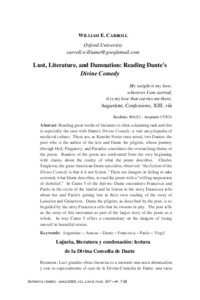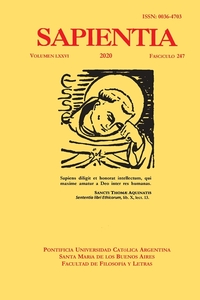Please use this identifier to cite or link to this item:
https://repositorio.uca.edu.ar/handle/123456789/13401| Título: | Lust, Literature, and Damnation: Reading Dante's Divine Comedy Lujuria, literatura y condenación: lectura de la Divina Comedia de Dante |
Autor: | Carroll, William E. | Palabras clave: | LITERATURA ITALIANA; LITERATURA MEDIEVAL; POESIA ITALIANA; ANALISIS LITERARIO; DIVINA COMEDIA | Fecha de publicación: | 2020 | Editorial: | Pontificia Universidad Católica Argentina. Facultad de Filosofía y Letras | Cita: | Carroll, W. E. Lust, Literature, and Damnation: Reading Dante's Divine Comedy [en línea]. Sapientia. 2020, 76 (247). Disponible en: https://repositorio.uca.edu.ar/handle/123456789/13401 | Resumen: | Abstract: Reading great works of literature is often a daunting task and this
is especially the case with Dante's Divine Comedy, a vast encyclopedia of
medieval culture. There are, as Kenelm Foster once noted, two Dantes: the
poet who is the author of the text and Dante the pilgrim, whose journey
through Hell, Purgatory, and Paradise constitutes the overarching theme of
the poem. Readers of the poem are confronted from the very beginning
with claims about the reality of what the poem describes. Charles
Singleton, the great American Dante specialist, observed: "the fiction of the
Divine Comedy is that it is not fiction." There are dangers in failing to take
seriously what Dante describes, to read the poem with a "willing suspension
of disbelief." In Canto 5 of the Inferno Dante encounters Francesca and
Paolo in the circle of the lustful and he listens to the story Francesca tells
about her and Paolo's getting lost in their own reading of the story of
Lancelot and Guinevere. Dante the pilgrim, as described by the poet, is so
beguiled by the story Francesca tells that he swoons in pity. The poet tells
us the story of this encounter as part of the larger story of the poem as a
whole. In way Canto 5 offers a commentary on the dangers of losing
oneself in beautiful stories. Resumen: Leer grandes obras literarias es a menudo una tarea abrumadora y este es especialmente el caso de la Divina Comedia de Dante, una vasta enciclopedia de la cultura medieval. Como señaló una vez Kenelm Foster, hay dos Dantes: el poeta, autor del texto, y Dante el peregrino, cuyo viaje por el infierno, el purgatorio y el paraíso constituye el tema principal del poema. Los lectores del poema se enfrentan desde el principio con afirmaciones sobre la realidad de lo que describe. Charles Singleton, el gran especialista estadounidense en Dante, observó: "la ficción de la Divina Comedia es que no es ficción". Hay peligros en no tomar en serio lo que describe Dante, en leer el poema con una "voluntaria suspensión de la incredulidad". En el Canto 5 del Infierno, Dante se encuentra con Francesca y Paolo en el círculo de los lujuriosos, y escucha la historia que Francesca cuenta sobre ella y Paolo perdidos en su propia lectura de la historia de Lancelot y Ginebra. Dante el peregrino, como lo describe el poeta, está tan cautivado por la historia que cuenta Francesca, que se desmaya de piedad. El poeta nos narra la historia de este encuentro como parte de un relato más amplio en el poema en su conjunto. De esta manera, el Canto 5 ofrece un comentario sobre los peligros de perderse en hermosas historias. |
URI: | https://repositorio.uca.edu.ar/handle/123456789/13401 | ISSN: | 0036-4703 | Disciplina: | LITERATURA | Derechos: | Acceso abierto | Fuente: | Sapientia Vol.76, No.247, 2020 |
| Appears in Collections: | SAP - 2020 Vol LXXVI nro. 247 |
Files in This Item:
| File | Description | Size | Format | |
|---|---|---|---|---|
| lust-literature-damnation.pdf | 260,28 kB | Adobe PDF |  View/Open | |
| cover_issue_409_es_AR.jpg | 132,87 kB | JPEG |  View/Open |
Page view(s)
90
checked on Apr 27, 2024
Download(s)
289
checked on Apr 27, 2024
Google ScholarTM
Check
This item is licensed under a Creative Commons License

